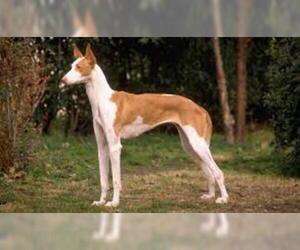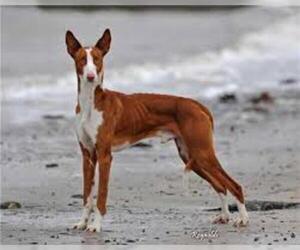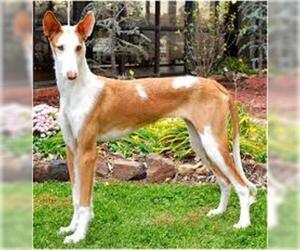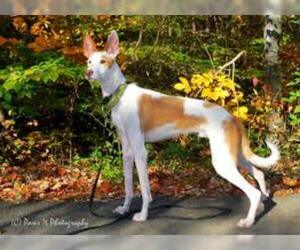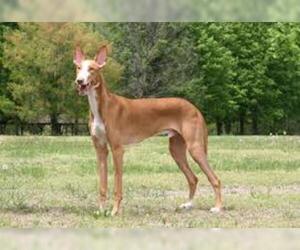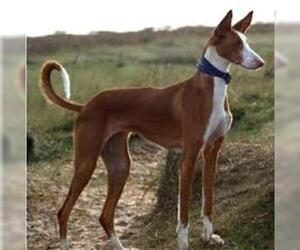
All about Ibizan Hound dog breed
A.K.A. :Podenco Ibicenco, Balearic Hound, Ca Eivissenc, Chien de Lapin, Majorcan Hound, Minorcan Hound, Warren Hound, Ibizan Warren Hound, Ibizan Podenco, Hound of Ibiza
Size
Grooming requirements
Exercise requirements
Good with other dogs
Watchdog ability
Energetic
Training requirements
Playful
Affectionate
Good with other pets
Good with children
Good with strangers
Winter
Summer
Healthiness
Protective
Life Span
| Pure Breeds | Member |
| Breeds A - Z | I |
| Breeds by Group | Hound Sighthound & Pariah |
| Breeds by Trait | Fast Dog Breeds High Stamina Dog Breeds Low Shedding |
| Overview: | The Ibizan Hound, or "Beezer," is an ancient and elegant sighthound hailing from the Balearic Islands of Spain, where it was historically used for rabbit hunting. This medium-to-large breed is instantly recognizable by its lean, athletic build, large erect ears, and graceful, deer-like appearance. They possess a gentle and affectionate temperament, often described as playful and clownish with their families, yet retain an independent streak characteristic of their hunting heritage. While generally good with children and other pets when properly socialized, their high prey drive means small, scurrying animals might be viewed as quarry. Their energy levels require regular exercise, making them better suited for homes with yards, although they can adapt to apartment living if their exercise needs are consistently met. Overall, Ibizan Hounds are a relatively healthy breed with few common genetic issues, though they can be sensitive to anesthesia. They make loyal and charming companions for active individuals or families seeking a unique and devoted canine friend. |
F.A.Q.
All You Need to Know About the Ibizan Hound Breed
The graceful Ibizan Hound, or "Beezer," hails from Spain's Balearic Islands, an ancient breed renowned for its elegant lines and athletic prowess. Known for their striking amber eyes and large, expressive ears, these sighthounds possess a unique "deer-like" appearance. Temperamentally, they are affectionate and playful with their families, yet can be reserved with strangers. While generally good with children, their high prey drive means they thrive in homes without small, furry pets. They are intelligent and sensitive, responding best to positive reinforcement training. Their short, easy-care coat requires minimal grooming, but their athletic build necessitates significant daily exercise, making them less suitable for apartment living unless ample outdoor time is guaranteed. Generally healthy, potential owners should be aware of possible issues like deafness and certain eye conditions. The Ibizan Hound makes a loyal and active companion for the right family.The average weight of an Ibizan Hound is 47 pounds. A healthy weight for an Ibizan Hound typically ranges from:* Males: 50-57 pounds* Females: 45-50 poundsThis range provides a good indication of the typical size for an adult Ibizan Hound.
Wondering about the Ibizan Hound height? These elegant hounds have a fairly consistent average size, making them a medium-to-large breed.
The average height of a Ibizan Hound, measured at the shoulder, is approximately 25.5 inches (65 cm).For adult Ibizan Hounds, you can expect a typical height range of:- Males: 23.5 to 27.5 inches (60-70 cm)
- Females: 22.5 to 26 inches (57-66 cm)
The Ibizan Hound breed comes in a striking array of Ibizan Hound colors. Officially recognized by major kennel clubs like the AKC recognized Ibizan Hound colors include white, fawn, red, and any combination of these. This means a solid white, solid fawn, solid red, or a piebald pattern of any of these colors (e.g., white with fawn patches, red with white markings) is acceptable.While other rare coat types or exotic Ibizan Hound variations might exist due to genetics, colors such as brindle, cream, blue, lilac, merle, or chocolate are not recognized by the AKC or most major kennel clubs for the Ibizan Hound. Adopters or buyers specifically seeking AKC-registered dogs should focus on the recognized white, fawn, and red color combinations when comparing coat types and pricing, as these are the accepted standards for the breed.
The Ibizan Hound personality is a unique blend of athleticism and gentle charm. Known for their striking appearance, their temperament of Ibizan Hound is equally captivating. They are typically affectionate and loyal with their families, often forming strong bonds. While generally friendly with people they know, they can be a bit reserved or watchful with strangers, though rarely aggressive.Sociability with other dogs is often good, especially if socialized from a young age, and they can be quite playful. However, as sighthounds, their strong prey drive means they may not be suitable for living with small, non-canine pets like cats, rabbits, or birds unless raised with them carefully and consistently.Ibizan Hounds are intelligent and sensitive. They thrive on positive reinforcement and can be quite trainable, though they have an independent streak. They are often good with children who understand how to interact respectfully with dogs, showing patience and a gentle nature.Regarding adaptability to apartment living, while active outdoors, they are surprisingly calm and quiet indoors, especially if given sufficient exercise. Their sleek, low-shedding coat also makes them relatively clean housemates. However, they need a secure yard to run in, as their prey drive and speed make them prone to chasing anything that moves. They are not dogs that can be reliably off-leash in unfenced areas. Their gentle and elegant nature, combined with their active lifestyle needs, makes them a rewarding companion for the right owner.
Ibizan Hound Temperament: An Elegant & Affectionate CompanionThe Ibizan Hound temperament is a captivating blend of quiet dignity, playful affection, and remarkable intelligence. Often described as a sensitive and graceful breed, they form strong bonds with their families.Friendliness & Sociability: Ibizan Hounds are generally friendly, though they can be reserved with strangers initially. Once they accept you, their affection shines through. They are sociable with other dogs they know, often enjoying the company of their own kind.Loyalty & Affection: This breed is incredibly loyal and devoted to their human companions, enjoying close physical contact and quiet companionship. They thrive on being an integral part of the family.Adaptability to Apartment Living: While possessing a strong prey drive and requiring regular exercise, Ibizan Hounds can adapt to apartment living if their physical and mental needs are met. They are relatively calm indoors, often enjoying a good nap on a soft couch. However, a secure outdoor space for running is highly beneficial.Behavior with Children: They are typically gentle and patient with children, especially those within their own family, making them good companion dog behavior for respectful youngsters. Supervision is always recommended with any breed and small children.Behavior with Other Pets: Due to their strong sighthound instincts, their behavior with smaller, non-canine pets (like cats, rabbits, or hamsters) can be a challenge. They may view them as prey. With proper introduction and supervision, some can coexist with cats, but it's not guaranteed. They generally get along well with other dogs, particularly those of similar energy levels.Tendencies Toward Stubbornness or Sensitivity: Ibizan Hounds can exhibit a degree of stubbornness, a common trait in intelligent hounds. This requires patience and positive reinforcement in training. They are also quite sensitive to harsh training methods or loud voices, responding best to gentle, consistent guidance and reward-based approaches. Their desire to please is strong, but so is their independent spirit.
Ibizan Hound Care: A low-maintenance breed perfect for many lifestyles. For daily maintenance, a quick brush a few times a week is sufficient due to their short, smooth coat; professional grooming is rarely needed. They are not a "low-energy" dog breed but require less structured exercise than some active breeds. Daily walks and playtime are essential to keep them happy and healthy, with bursts of high-speed running being a natural outlet for their sighthound instincts.
Dietary considerations involve a high-quality, balanced diet appropriate for their age, size, and activity level. Monitor food intake to prevent obesity, as weight management is crucial for joint health. Wrinkle and ear cleaning are not generally a concern for the Ibizan Hound as they lack prominent wrinkles and have large, erect ears that typically self-clean. They are not brachycephalic, so climate sensitivity due to that anatomy is not an issue. However, their thin coat offers little protection from extreme cold, so provide warmth in winter. Conversely, in hot weather, ensure access to shade and water to prevent overheating. Common health concerns include relatively few breed-specific issues. However, like all breeds, they can be susceptible to skin issues (allergies, dry skin), which often respond well to good nutrition and regular bathing. Dental care is paramount; regular brushing and professional cleanings are vital to prevent periodontal disease. For more health tips for Ibizan Hound, consult your veterinarian for preventative care and early detection of any potential problems. Regular vet check-ups are key to their long-term well-being.Ibizan Hound Activity Level: Graceful Athletes with an Off-SwitchThe Ibizan Hound activity level is best described as high-energy for short bursts, followed by long periods of relaxed rest. These elegant sighthounds possess a unique balance, making them suitable for active families who appreciate a calm indoor companion.How active are Ibizan Hound? They are definitely not low-energy couch potatoes, but neither are they perpetually hyper. Expect them to need significant daily exercise to be happy and well-adjusted. Their exercise needs include at least 60-90 minutes of vigorous activity daily. This can be broken down into multiple sessions of running, chasing, or playing fetch in a securely fenced area. Due to their strong prey drive, off-leash exercise should only occur in very safe, enclosed spaces. They love to run and can reach incredible speeds, so a large, secure yard is ideal.Playtime preferences include chasing lure coursing, playing with squeaky toys, and engaging in energetic games with their human companions. While they thrive on active play, they are not brachycephalic, meaning they do not suffer from the breathing limitations associated with short-nosed breeds. This allows them to sustain activity more comfortably than some other breeds.After their exercise, Ibizan Hounds are typically very calm and quiet indoors, enjoying long naps on soft bedding. They are excellent at balancing their need for intense physical activity with a desire for peaceful relaxation. They are a good fit for active families who can provide consistent exercise opportunities and enjoy outdoor activities, but also appreciate a quiet, loving companion at home. While they are not suitable for entirely low-energy households, families who are active for a portion of their day will find the Ibizan Hound a rewarding and adaptable companion.
Breed Breakdown: What Experts Say About the Ibizan Hound
I'd rate the "Size" trait of the Ibizan Hound at a 7.While not giant, Ibizan Hounds are distinctly medium-to-large dogs. They stand quite tall, averaging between 22.5 to 27.5 inches at the shoulder, and are lean but muscular, typically weighing 45 to 65 pounds. Their sighthound build gives them an elegant, athletic frame rather than a bulky one, but their height and length mean they take up a considerable amount of space. Compared to most companion dogs, they are on the larger side, easily surpassing popular breeds like Beagles, Cocker Spaniels, and even many types of Retrievers in terms of height. This size makes them less ideal for tiny apartment living, as they need room to stretch out and move comfortably, and can be challenging for frequent air travel due to crate size restrictions. They are best suited for households with at least moderate space, a fenced yard being a significant plus, as their long legs demand room for exercise and relaxation.
I would rate the Ibizan Hound's "Grooming Requirements" at a 2 out of 10.This breed is remarkably low-maintenance in terms of grooming. Their short, smooth, and close-lying coat (or the slightly longer, wirehaired variety) sheds minimally and doesn't tangle or mat, requiring only an occasional brush to remove loose hairs and keep it shiny. They are not prone to excessive drooling or a "doggy odor," meaning bathing is infrequent, perhaps every few months or as needed. Their ears are upright and open, making them less susceptible to infections and relatively easy to clean with a quick wipe. They don't have skin folds that require special attention, and while regular nail trims are necessary like any dog, it's not a uniquely demanding aspect of their care. They are generally a healthy breed with no particular susceptibility to skin issues or allergies that would necessitate specialized grooming routines. Compared to many other companion dogs with elaborate coats or sensitive skin, the Ibizan Hound is exceptionally easy to care for, making them an excellent choice for owners seeking a low-grooming commitment.
I would rate the Ibizan Hound's exercise requirements as an 8 out of 10.While not hyperactive in the home, Ibizan Hounds possess a deeply ingrained sighthound instinct for running and chasing, demanding a significant amount of structured physical activity to remain healthy and mentally stimulated. They have high energy levels and thrive on sustained movement, needing daily opportunities to stretch their long legs and run at full speed. A quick walk around the block is insufficient; they require at least an hour to two hours of vigorous exercise daily, which can include off-leash running in a securely fenced area, long hikes, or participation in dog sports like lure coursing, agility, or obedience. Their lean, athletic build and deep chest are perfectly adapted for bursts of speed and endurance. They are not brachycephalic, so respiratory limitations are not a concern, allowing them to excel in activities requiring sustained effort. Without adequate exercise, they can become bored, destructive, and even anxious. They genuinely thrive with a routine that incorporates plenty of active play and purposeful running.
I would rate the Ibizan Hound's "Watchdog Ability" at a 6 out of 10.While not inherently aggressive or territorial in the same way some guarding breeds are, the Ibizan Hound is an intelligent and often surprisingly observant dog. They are generally quite alert to their surroundings and will typically notice and respond to unusual sounds or the arrival of unfamiliar people. Their response, however, is more likely to be a series of sharp, attention-grabbing barks rather than a display of overt aggression or a direct attempt to deter an intruder. They are more inclined to vocalize a warning to their owners, making them effective early warning systems. Their keen senses, especially hearing, contribute to their ability to pick up on things before their human counterparts. They are not typically prone to excessive, nuisance barking, but will use their voice when they perceive something is amiss. They are more of a passive companion that offers meaningful early warnings rather than a breed willing or consistently capable of deterring a determined intruder beyond vocalizing their presence.
I would rate the "Good with Other Dogs" trait of the Ibizan Hound an 8 out of 10.Ibizan Hounds generally have a very sociable and friendly disposition towards other dogs. They are not typically prone to aggression or dominance and often thrive in the company of other canines, making them well-suited for multi-dog households. Their sighthound heritage means they can enjoy playful chases and often understand the nuances of dog-to-dog communication well. While they are usually adaptable to dogs of various sizes and energy levels, their natural play style can sometimes be quite energetic and boisterous, which might be overwhelming for very small or extremely sedate dogs, requiring some supervision. Early socialization is always beneficial for any breed to ensure consistent good manners, but Ibizan Hounds are typically quite open and welcoming to new canine friends and usually require careful introductions only in extreme cases of unusual personality or past trauma.
I would rate the Ibizan Hound's "Energetic" trait a 7 out of 10.While often described as graceful and elegant, the Ibizan Hound is, at its heart, a sighthound bred for chasing down swift prey across open terrain. This heritage translates to a naturally high activity level and impressive endurance. They possess an inherent desire to run and chase, exhibiting bursts of incredible speed and agility. Their playfulness often involves vigorous games of chase and "keep away," and they have a significant need for physical stimulation to remain content and well-behaved. They excel in outdoor and athletic activities such as lure coursing, agility, and long walks or runs.Compared to many other companion breeds, the Ibizan Hound is definitely more active than laid-back. However, they are not typically "hyper" in the way some working or herding breeds can be, and they do appreciate a comfortable spot to recline and relax indoors after they've had their fill of exercise. They are also not a brachycephalic breed, meaning their normal muzzle length and open airways allow for excellent stamina and exercise tolerance without the breathing difficulties that affect flat-faced dogs. This anatomical advantage contributes significantly to their ability to engage in sustained athletic activity. They can go from zero to sixty in a blink and maintain that level of exertion for a considerable time.
I would rate the "Training Requirements" of the Ibizan Hound an 8 out of 10.While intelligent and capable of learning, the Ibizan Hound is often described as independent and possessing a strong sighthound prey drive, which can make training challenging. Their attention span can be fleeting, especially if something more interesting (like a squirrel) catches their eye. They are not inherently eager to please in the way some retriever breeds are, and can exhibit a stubborn streak, requiring a great deal of patience and consistency from their owner. Responsiveness to commands can vary greatly depending on the environment and the perceived "value" of the reward. Positive reinforcement is highly effective, but it needs to be engaging and consistent to capture and maintain their interest. This breed is generally not considered beginner-friendly and often requires an experienced handler who understands sighthound psychology, can provide structured routines, and is prepared to dedicate significant time and effort to consistent, positive-based training. Owners must be creative in making training fun and rewarding to overcome their inherent independence and avoid boredom.
I would rate the Ibizan Hound's "Playful" trait a 7 out of 10. While not hyperactive like some terrier breeds, the Ibizan Hound possesses a distinct and engaging playfulness. They are naturally spirited and athletic, with a strong love for games, especially those involving chasing and "the hunt." Their lean, agile bodies are built for speed and they thoroughly enjoy opportunities to stretch their legs and engage in vigorous play. They respond well to toys, particularly those that can be retrieved or chased, and often instigate playtime with their humans through nudges or playful bows. However, they aren't constantly "on" in the way some more boisterous companion dogs might be. They also appreciate quiet downtime and are capable of being quite relaxed indoors. Their playful bursts are often enthusiastic and focused, rather than a continuous, attention-seeking frenzy. Compared to many companion breeds, they are certainly more active and have a higher need for engaging play, but their playfulness is also intertwined with their independent and sometimes dignified nature. They are fun-loving and enjoy interaction, but also capable of entertaining themselves or resting contentedly when play isn't available.
The Ibizan Hound, while known for its independence, exhibits a surprising level of affection within its chosen family, warranting a rating of 7. They aren't the most overtly demonstrative or constantly "in your face" affectionate breed, but their love runs deep and is expressed in subtle yet meaningful ways. They absolutely desire human companionship and form strong bonds with their owners, often following them from room to room as a quiet sentinel rather than a demanding shadow. While not typically lap-sitters (their size and sighthound nature often mean they prefer a nearby comfortable spot), they do enjoy physical closeness on their own terms, such as leaning against you or a soft nuzzle. Their loyalty is unwavering, and they are remarkably sensitive to owner emotions, often offering a comforting presence when they sense distress. They thrive on the calm reassurance and attention of their family, and while they won't demand constant petting, they will actively seek out opportunities for a gentle scratch or a shared moment on the couch. Compared to other companion dogs, they are more independent, but this doesn't equate to emotional distance; rather, it's a testament to their self-assured nature that still deeply values and reciprocates affection.
I would rate the Ibizan Hound's "Good with Other Pets" trait a 6 out of 10.While Ibizan Hounds are generally good-natured and not inherently aggressive, their strong sighthound prey drive significantly impacts their compatibility with smaller, non-canine pets, particularly cats and other small animals. They typically coexist very well with other dogs, often enjoying canine companionship and being quite sociable in a multi-dog household. Resource guarding among dogs is not a prominent trait for the breed. However, their instinct to chase anything that moves quickly can be a major challenge when introducing them to cats. While some individual Ibizans can be raised to tolerate or even bond with cats, this usually requires extensive, careful, and early socialization, constant supervision, and a home environment designed to keep the cat safe. It's not a natural "live and let live" instinct with all small creatures. For homes with cats, it often requires a lot of training and ongoing management to ensure peaceful coexistence, and even then, some individuals may never be fully trustworthy. Therefore, while great with other dogs, their strong prey drive lowers their overall score for general "other pet" friendliness.
I'd rate the "Good with Children" trait of the Ibizan Hound at a 6 out of 10.While not inherently aggressive or ill-tempered, the Ibizan Hound isn't a breed that naturally excels with young children without considerable guidance and supervision. Their primary temperament is often described as gentle and sensitive, but also independent and reserved. They are generally patient and tolerant, especially with older, more respectful children who understand how to interact calmly with a dog. They can be playful, enjoying a good romp in the yard, but they aren't typically the boisterous, constantly-in-your-face type of dog that thrives on constant child-initiated attention.Their lower rating stems from their potential for sensitivity to sudden loud noises or overly boisterous handling, which can be common with very young children. While they might tolerate it, they could also become withdrawn or stressed rather than engaging. They are not naturally as outwardly affectionate or "cuddly" with children as some other breeds, and their independent nature means they might prefer to retreat rather than participate in energetic games. Early socialization and consistent training are crucial to ensure they are comfortable and well-adjusted around children. With proper training for both the dog and the children, and a family that understands their somewhat reserved nature, they can certainly thrive, but they aren't a breed you can simply trust to be exceptionally child-friendly without effort.
I would rate the Ibizan Hound's "Good with Strangers" trait a 6 out of 10.While not inherently unfriendly, Ibizan Hounds are typically reserved and can be quite cautious around unfamiliar adults. They are not the type of dog to immediately solicit attention from everyone they meet, and often prefer to observe new people from a distance before deciding to approach. This isn't due to aggression, but rather a natural independence and a wary nature stemming from their sighthound heritage. They are generally polite and non-reactive, with barking usually reserved for alerting rather than true guarding. With proper socialization, they can become comfortable and even politely accepting of guests and public environments, but they are unlikely to ever be overly effusive or boisterously welcoming like some more gregarious breeds. They won't usually be a "party animal" who greets every person with a wagging tail and licks, but they won't be hiding under the furniture either. Their comfort with strangers is more about tolerance and quiet acceptance, and less about an innate desire for interaction.
The Ibizan Hound, with its short, fine coat, lean body, and lack of significant insulating fat, exhibits a clear sensitivity to cold weather. Their sighthound build, while contributing to their speed and agility, offers little protection against dropping temperatures. They are not brachycephalic, which might seem to alleviate some cold-weather concerns, but their overall lack of insulation makes them highly susceptible to hypothermia in cold environments. Prolonged exposure can quickly lead to discomfort and health risks. Therefore, on a scale of 1 to 10, their winter tolerance would be a 3.Compared to many other companion dogs, the Ibizan Hound definitely requires special care during winter months. They are not suited for prolonged outdoor activity in cold climates without substantial protection. Owners should be prepared to provide sweaters or coats for even short walks, limit outdoor time, and ensure a warm indoor environment. They are not a breed that can be left outside in chilly weather, nor are they typically suitable for extended winter hikes or activities where a thicker-coated dog might thrive. Their needs are more akin to short-haired toy breeds or those with very little body fat when it comes to cold weather protection.
The Ibizan Hound boasts a "Summer" tolerance of 8 out of 10. This breed, originating from a warm climate, is remarkably well-suited to heat. They are not brachycephalic and possess a lean, athletic build with a short, single coat (though wire-haired varieties exist, they still offer good heat dissipation). These factors allow them to regulate body temperature efficiently. While no dog is immune to heatstroke, their risk is lower than many other breeds, especially those with thick coats or short muzzles. They generally enjoy outdoor activity, even in warmer weather, but common sense dictates avoiding peak heat hours and strenuous exercise during the hottest part of the day. They do not typically require extensive climate control beyond what would be comfortable for humans. Compared to many companion dogs, particularly those with dense fur, brachycephalic features, or originating from colder climates, the Ibizan Hound requires less special care in summer months, primarily needing access to shade, fresh water, and a mindful approach to exercise times.
The Ibizan Hound rates an 8 out of 10 for healthiness.This breed is renowned for its robust health and relatively few genetic predispositions compared to many other purebred dogs. Their deep gene pool and natural athleticism contribute to their excellent resilience. While no breed is entirely free of potential issues, Ibizan Hounds are not plagued by common breed-specific problems like severe breathing difficulties (brachycephalic breeds), widespread debilitating joint problems (like many large breeds), or chronic skin conditions. Their average life expectancy is a healthy 11 to 14 years, with many living even longer. Responsible breeding practices further enhance these positive traits by screening for issues like deafness (though rare) or eye conditions. They are generally considered a low-maintenance breed in terms of health, rarely requiring extensive or specialized veterinary care beyond routine preventive measures.
I'd rate the "Protective" trait of the Ibizan Hound at a 3.While intelligent and loyal to their families, Ibizan Hounds are generally not considered a protective breed in the traditional sense. They are certainly alert and will often bark at new sights or sounds, making them decent watchdogs in that they will notify you of an intruder's presence. However, their territorial instincts are moderate, and they are more likely to observe a stranger than confront them aggressively. Their gentle and often reserved nature with people they don't know means they're unlikely to offer meaningful physical protection. They are primarily companion dogs and athletic hunting hounds, excelling in their original purpose rather than as guard dogs. Their "protection" largely comes from their initial alarm rather than a strong drive to defend.
I'd rate the "Life Span" trait of the Ibizan Hound an 8 out of 10.Ibizan Hounds are considered a long-lived breed compared to many other companion dogs. Their average life expectancy typically ranges from 12 to 14 years, with many individuals living well into their mid-teens. They are generally a healthy and robust breed with fewer genetic predispositions to serious health issues than some other purebreds. While responsible breeding and care, including proper nutrition and exercise, are always crucial for any dog's longevity, the Ibizan Hound's inherent genetic makeup contributes significantly to their extended lifespan. They are not prone to the widespread orthopedic problems or certain types of cancers that affect some larger or more heavily bred dog breeds.
Ibizan Hound Dogs for adoptionSee all dogs for adoption
Ibizan Hound BreedersSee all breeders
Similar Dog Breeds for Ibizan Hound
Breed Mixes of Ibizan Hound
Quick Breed Selector 0 - not important, 1 - smallest, 10 - largest
Variants & Mistakes :Ibezan Hound, Ibizan Houn, Ibizan Houndd, Ibizan Hoound, Ibizan Houund, Ibizan Hounnd, Ibizan Hound , Iziban Hound, Ibaizan Hound, Ibizaan Hound, Ibizan Houmd, Ibizan Houbd, Ibizan Hougd, Ibizan Houjd, Ibizan Houkd, Ibizan Houln, Ibizan Houlnd
